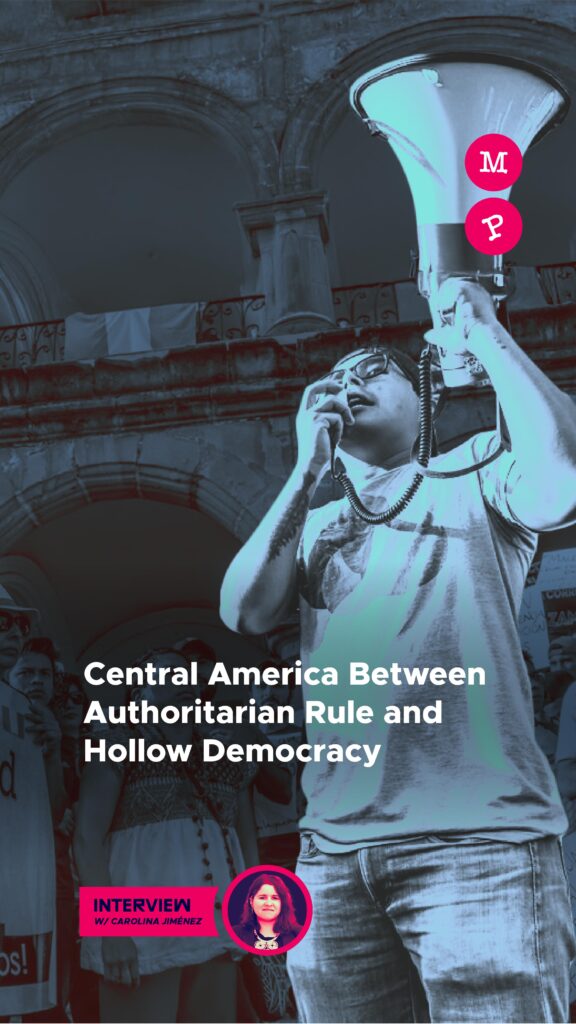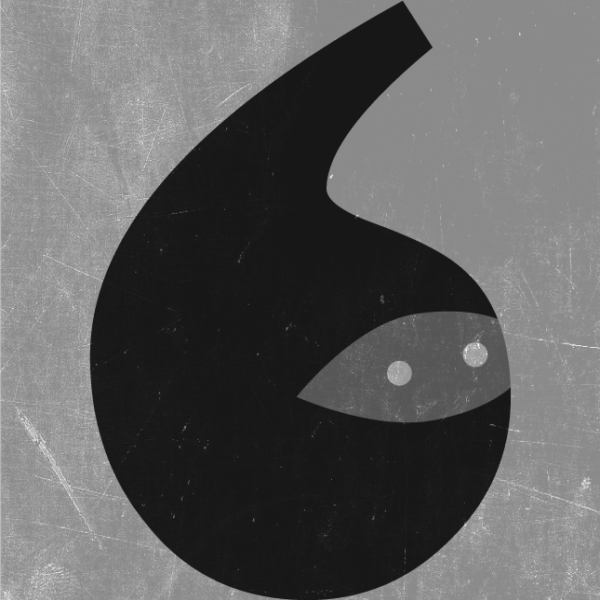

HoraCero: What is the origin or genesis of these new authoritarian times we are experiencing? At what point or during what process did the human rights situation at the regional level begin to deteriorate?
Carolina Jiménez: Well, first, thank you for the invitation to the interview, and always thank HoraCero for continuing to produce high-quality journalism despite these difficult circumstances.
It’s a very important question, but also a very difficult one because Central America is a heterogeneous, complex region, and, as you rightly said, with a multi-crisis rooted in history. So, it’s difficult to pinpoint a specific moment. I could talk about two or three moments that I think explain a bit where we are now. I want to start with Nicaragua, right? Nicaragua is undoubtedly the most consolidated autocracy in Central America, and I think 2018 marks a before and after. Not because in 2018 we realized that Daniel Ortega and Rosario Murillo were a dictatorship, but because perhaps the world realized the ferocity of their repression. That always marks a turning point in how authoritarianism is conceived. And from then on, especially since April 2018, we’ve seen the international community’s response to specialized documentation mechanisms, whether through regional mechanisms like the Inter-American Commission on Human Rights, and subsequently the United Nations’ response, individual sanctions from the European Union, the United States… Well, the entire diplomatic revolution that’s taking place regarding Nicaragua stems from that.
So, it’s not that we discovered authoritarianism in Nicaragua, but we did discover the consolidation or the clearest expression of the ferocity of its repression. And having the most consolidated autocracy in the region in a region like Central America is no small fact. I think 2018 marks the before and after for Central America.
I think that after 2018, we can talk about electoral moments that mark another difficult moment for the region, and that is the democratic election of authoritarians, right?
I think the election of Nayib Bukele is perhaps one of the most bittersweet lessons we have in the region, because the election of Nayib Bukele, both the first, which is perfectly acceptable, and the second, which is questionable…
Because, well, it is based on a very narrowly tailored reinterpretation of the Constitution, but it is still a highly voted-for election, even if it has a problem with its legitimacy. It shows that it’s through elections that we’re now seeing the rise of authoritarians to power in the region. And that democracy, when we reduce it to an electoral and popularity issue, we empty it of content.
Nayib Bukele’s authoritarianism is an authoritarianism that has also been consolidating very quickly, with a very rapid concentration of power in the hands of the executive branch, but which insists on using the very elements of democracy: elections, the seizure of legislative power through the occupation of the majority of the Nuevas Ideas party.
HoraCero: Right now, what is the situation for these Central Americans in the United States? How could you describe it or tell us about it for a wider audience?
Carolina Jiménez: Look, I think you’ve used a word that describes current immigration policy very well, which is persecution.
The campaign promise for this second term was mass deportations. If you think about Donald Trump’s first presidential campaign, in 2016, you remember the construction of the wall, for example. That was one of Trump’s obsessions. Now, he doesn’t even remember the wall; it’s barely mentioned. The keyword now is mass deportations.
These involve a different type of strategy: widespread raids throughout the country, arrests of migrants living in the country without documentation, who must be subject to deportation proceedings. Now, deportation, and this is important, is a process, not a moment.
That process involves arrest, detention in an immigration detention center, legal processing, access to legal recourse to defend one’s case, and eventually an order determining whether one should be deported or not. The execution of the deportation is the final step, and can be by land or air. This is costly and logistically complex: there are at least 13.8 million undocumented people in the US. The government knows it’s impossible to deport them all. That’s why it has turned to the theory of self-deportation.
The Trump administration has asked Congress for an exorbitant sum to increase its deportation capacity, but even if the funds are approved, it would generate a large fiscal deficit. Furthermore, the US economy depends on migrant labor. The president has already acknowledged this: agriculture, hospitality, and construction are suffering. It’s not a simple problem.
HoraCero: What role or responsibility do you see for the United States in these expressions of authoritarianism in Central America?
Carolina Jiménez: For the first time in its history, the United States has a Hispanic Secretary of State. Those of us who have fought for years to make Latin America a priority in its foreign policy has finally been achieved it. For better or worse.
With Marco Rubio as Secretary of State, and with priorities such as migration, security, trade, and containing China, Latin America became a priority. But what did Rubio do? Regarding Nicaragua, he simply applied a visa ban to more than 200 officials, something Biden had already done.
We expected more from a politician who had been openly critical of Ortega. Instead of improvising, he could have brought together Nicaraguan and international civil society to design a strategy. He didn’t. The result was a policy with no real effect, a Band-Aid.
In El Salvador, the situation is even more serious. There is complicity. Both administrations share authoritarian values: breaking rules to achieve political objectives. We saw this with the illegal transfer of 238 Venezuelans to the CECOT (Center for the Confinement of Terrorism. People with no criminal record, imprisoned in a country where they never committed crimes.
Bukele has accelerated authoritarianism. Before, at least, one could call Washington to express concern. Today, with the arrest of Ruth López, Fidel Zavala, and Enrique Anaya, there is no one to call. This emboldens Bukele. It allows him to imprison human rights lawyers and block the press, reminding us of the worst moments of El Salvador. My deepest solidarity with their families.
HoraCero: What role can these international actors play without undermining sovereignty or allowing further repression in the countries they seek to influence?
Carolina Jiménez: We must be very careful how we use the term «sovereignty,» because for authoritarians, it is an excuse to commit arbitrary acts without accountability. Human rights are universal. As Martin Luther King said, «Injustice anywhere is a threat to justice everywhere.»
In difficult contexts like Nicaragua, international mechanisms like the UN working group or the IACHR’s MESENI (Inter-American Commission on Human Rights ) remain vital. Although many say they «have no effect,» documentation is essential to history.
Roberto Garretón, a lawyer in Chile during the dictatorship, understood this very well: document each case, even if it’s just a stamp on a police station. Thanks to these archives, truth reports were constructed and those responsible were prosecuted.
The same is happening today with organizations that document violations from exile or neighboring countries. Those investigating transnational corruption must also coordinate more closely, because this type of corruption—grandstanding corruption linked to drug trafficking, economic elites, and governments—is regional and requires coordinated responses.
HoraCero: What relationship do you see between climate change, human rights, and migration patterns in Central America? What should the international community’s response be?
Carolina Jiménez: This is a critical moment to fight the climate crisis, but also a very difficult one, due to decisions such as the US withdrawal from the Paris Agreement or the elimination of funding for science and environmental organizations.
Central America, due to its geography, is one of the most affected regions: hurricanes, the Dry Corridor, and internal and cross-border displacement. However, few government voices are making this issue a priority.
At the level of human rights, the right to a healthy environment is relatively new. The UN recently recognized this, and now the Inter-American Court is about to issue a key advisory opinion: what are the obligations of States in the face of the climate crisis?
When that opinion is issued, it will be a crucial guide. Although opinions are not binding, they are guiding. The relationship between climate change and forced migration is documented, but there is no legal protection: legally, there is no such thing as a «climate refugee.»
It’s a long-term struggle. Furthermore, climate change also erases memory. We experienced this in a meeting with a community in southern Mexico that was displaced by the advancing sea. One young woman said, «I don’t remember what my grandparents’ house looked like anymore.» It was a revelatory moment: climate change also erases a community’s history.
That, too, is a violation of human rights. And it’s something we are still not studying or addressing sufficiently.

| Cookie | Duración | Descripción |
|---|---|---|
| cookielawinfo-checkbox-analytics | 11 months | This cookie is set by GDPR Cookie Consent plugin. The cookie is used to store the user consent for the cookies in the category "Analytics". |
| cookielawinfo-checkbox-functional | 11 months | The cookie is set by GDPR cookie consent to record the user consent for the cookies in the category "Functional". |
| cookielawinfo-checkbox-necessary | 11 months | This cookie is set by GDPR Cookie Consent plugin. The cookies is used to store the user consent for the cookies in the category "Necessary". |
| cookielawinfo-checkbox-others | 11 months | This cookie is set by GDPR Cookie Consent plugin. The cookie is used to store the user consent for the cookies in the category "Other. |
| cookielawinfo-checkbox-performance | 11 months | This cookie is set by GDPR Cookie Consent plugin. The cookie is used to store the user consent for the cookies in the category "Performance". |
| viewed_cookie_policy | 11 months | The cookie is set by the GDPR Cookie Consent plugin and is used to store whether or not user has consented to the use of cookies. It does not store any personal data. |